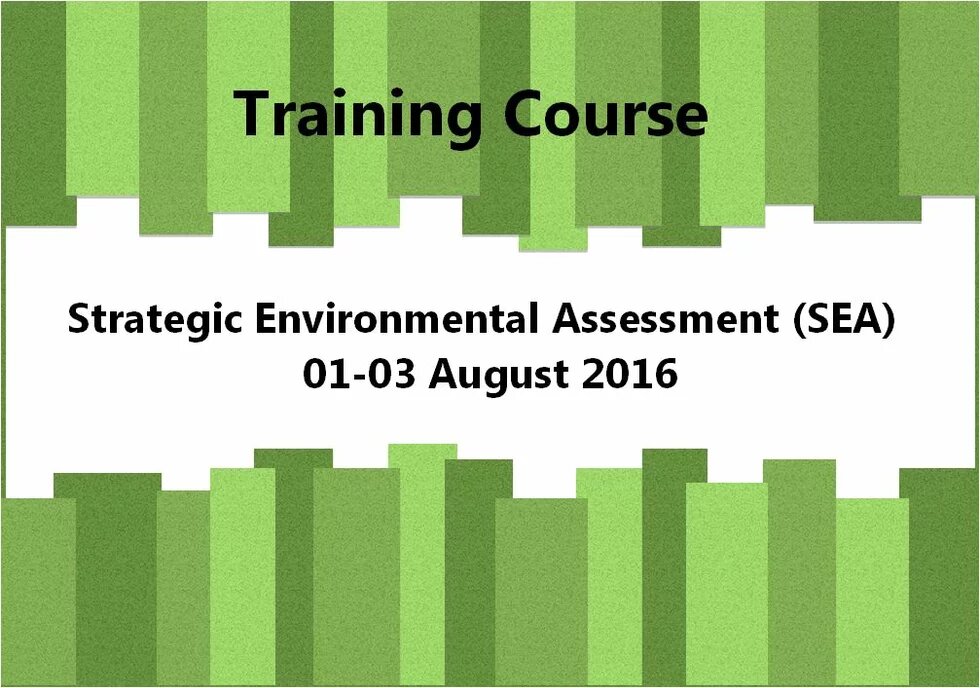
Heinrich Boell Foundation’s Palestine & Jordan Office is holding a training on Strategic Environmental Assessment (SEA) in Ramallah, Palestine between 01-03 August 2016. We encourage applicants interested in the topic to apply for the training.
The training is also open for our partners in Palestine. We encourage our partners to contact us to inform us of the employees who will attend the training from their organizations.
Below you can find more information on the training and application process.
Instructor
Dr. Suha al-Madbouh
Strategic Environmental Assessment (SEA)
SEA is a systematic, decision aiding procedure for evaluating the likely significant environmental effects of a policy, plan, or program (PPP) through their development process and beginning at the earliest opportunity. In other words, it is an environmental assessment done at a high strategic level of decision- making (i.e., at the PPP level). It involves evaluation and analysis processes, reporting and recommendation of sustainable measures to mitigate adverse environmental and socio-economic impacts of the PPP, and consideration of the findings in the decision-making processes (i.e., adjustment). The involvement of the stakeholders and the public from the very beginning and throughout the whole SEA process is fundamental. Accordingly, SEA aims mainly at integrating environmental considerations into the policies, plans, and programs and evaluating the inter-linkages with economic and social considerations.
Overall objective of the training
The overall objective of the training course is to learn international theories, terminologies, principles, and practical processes related to SEA, with particular focus on methods of performing and producing SEA.
Intended learning outcome
After completion of the training, the participants will…
- be able to plan a SEA
- by applying standard methodological approaches for SEA
- be able to support the decision making process for environmental management.
Training main content
The training consists of lectures, exercises, and case studies. The lectures provide theoretical and conceptual explanations of different aspects related to approaches, applications, legal frameworks, and methodology of SEA. Exercises are used during the lectures to apply various aspects associated with the practical process, terminology, and methods of performing SEA. Finally, different case studies will be discussed and analyzed.
Participants
The participants can be from different Palestinian governmental and non-governmental organizations as well as academic institutions and universities.
For interested applicants, please submit the following documents:
- Application form (DOWNLOAD Application Form)
- CV
For our partner organizations, you can inform us of the employees who will attend from your organizations.
Application submission deadline
Please submit the application form and CV no later than 6 June 2016 to Ms. Ronza Almadbooh at: ronza.almadbooh@ps.boell.org.
Date and place of Training
The training will take place in Ramallah, Palestine on 01-03 August 2016. The first two days of the training will be from 9:00 a.m.- 5:00 p.m. while the third day will be for four hours only. We will later share the schedule and outline of the training with the applicants.
Language of instruction
English
Training prerequisite
- The participants should have good proficiency in English. While the lecturing language is in English, the participants can still discuss and raise questions in Arabic language.
- The participants should be interested in the topic of the training.
- Participants’ involvement at the policy-making level in their professions will maximize their benefit from the training.
- Participants’ background in one or more of the following fields is preferable for achieving the training learning outcome: Environmental sciences, Socio-economic sciences, Political sciences, agricultural sciences, Water Resources and Natural Resource Management, Ecology, and/or Environmental or Civil Engineering.
